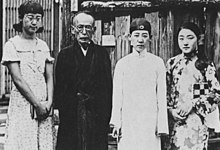| This article needs additional citations for verification. Please help improve this article by adding citations to reliable sources. Unsourced material may be challenged and removed. Find sources: "Kawashima Naniwa" – news · newspapers · books · scholar · JSTOR (November 2018) (Learn how and when to remove this message) |
Kawashima Naniwa (Japanese: 川島浪速; Kawashima Naniwa; 1865–1949) was a Japanese adventurer in China, known for his activities supporting the Qing dynasty. He was the foster father of the Japanese spy Kawashima Yoshiko.
Biography
Kawashima Naniwa was born on 23 January 1866, to a samurai family in the castle town of Matsumoto in Shinano Province. In 1882, he enrolled at the Tokyo School of Foreign Languages and studied Chinese. He left school in 1885 and began traveling in China. Kawashima returned to Japan due to illness in 1889.
Kawashima followed the Japanese army as an interpreter in the First Sino-Japanese War in 1894. After the Japanese victory he worked for the Government-General of Taiwan, before returning to Japan in 1897 to serve as a Chinese teacher at the Army Academy and Tokyo Higher Normal School.
in August 1900, Kawashima again went to China as an interpreter with the Japanese contingent of the Eight-Nation Alliance forces during the Boxer Rebellion. He was also made a civilian official in the military police section. After the allied forces occupied Beijing, he was charged with training police officers among the Chinese. Upon the reversion of control to the Qing government, they left this police force intact and contracted Kawashima to help create a modern police organisation. Kawashima organised a police academy in Beijing and served as its principal.
Kawashima became a close friend of Shanqi, the 10th Prince Su, who was chief of the new police force, and later interior minister. After the 1911 Revolution and the abdication of the Xuantong Emperor in 1912, Kawashima helped Prince Su and his family flee to the Kwantung Leased Territory. Kawashima aided Prince Su and his Royalist Party in attempts to create an independent Manchu state under a restores Qing dynasty.
In 1915, Prince Su sent his fourteenth daughter, the eight-year old Dongzhen (東珍; "Eastern Jewel") to be fostered by Kawashima in Japan. Kawashima raised her as his own daughter gave her the Japanese name Kawashima Yoshiko. She later became a spy for the Japanese Army.
References
- ^ Reynolds 1993, pp. 195–197.
- Hattori 2011, p. 68.
Bibliography
- Hattori, Ryûji (March 2011). "Japan's Continental Expansion Policy and the Chinese National Revolution Movement". JAPAN-CHINA JOINT HISTORY RESEARCH REPORT: MODERN AND CONTEMPORARY HISTORY. Vol.1 (PDF). Japan-China Joint History Research Committee. pp. 66–94.
- Reynolds, Douglas R. (1993). China, 18g8-1912: The Xinzheng Revolution and Japan. Cambridge, Massachusetts: Harvard University Asia Center. ISBN 0-674-11660-7.
External links
This biographical article related to Japan is a stub. You can help Misplaced Pages by expanding it. |
